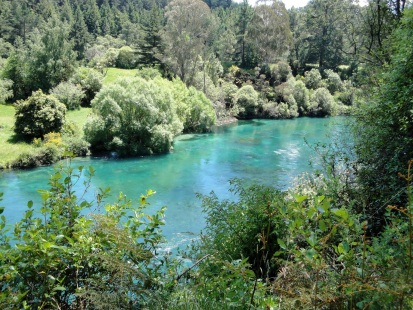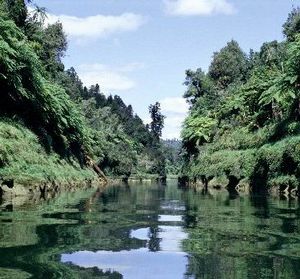Water in Aotearoa New Zealand
November 28, 2012
Waikato taniwha rau, he piko he taniwha,he piko he taniwha
Waikato, home of many chiefs.
Tuatahi ko te wai, Tuarua whanau mai te tamaiti, ka puta ko te whenua.
At birth water comes first, then the child, followed by the placenta known as whenua (land).
 Both these Whakatauki (proverbs) reflect the importance of water to Maori - all rivers, streams and significant bodies of water throughout Aotearoa New Zealand play a pivotal role in providing sustenance as well as sacredness to the livelihood of all. When tangata whenua (people of the land (Maori)) introduce themselves they will always name their river; i.e. the significant body of water that sustains them. The first Whakatauki highlights the importance of the Waikato River (Aotearoa New Zealand’s longest river) to the confederated tribes of Tainui (iwi/hapu) that live along its length.
Both these Whakatauki (proverbs) reflect the importance of water to Maori - all rivers, streams and significant bodies of water throughout Aotearoa New Zealand play a pivotal role in providing sustenance as well as sacredness to the livelihood of all. When tangata whenua (people of the land (Maori)) introduce themselves they will always name their river; i.e. the significant body of water that sustains them. The first Whakatauki highlights the importance of the Waikato River (Aotearoa New Zealand’s longest river) to the confederated tribes of Tainui (iwi/hapu) that live along its length.
Water is considered to be the foundation of all life – it gives and sustains life. It is a place of ritual, food source, means of travel and trade. Rivers and streams are considered the blood vessels of Papatuanuku (Earth Mother). They help wash away any impurities and help keep the land healthy. Each significant body of water has its own particular mauri (life source). Therefore there is a responsibility to protect and keep clean the waters and waterways. If the waters are not kept clean, mauri could be lost and death can result.
Hydro-electric dams provide most of New Zealand’s renewable energy. Careful water management (from an ecological perspective) of hydro-electric dams is crucial for the health of rivers, as water flow, quality and temperature can be affected by mismanagement. This in turn will affect the life of rivers and streams that surround hydro-electric dams. For example, restricting the natural flow of rivers will make river bottoms muddier - affecting the water quality and food supply vital for freshwater species survival like that of the long-finned eel. Thus the mauri of a river way is significantly affected by the management choices of a hydro-electric power company.
A crucial issue, in New Zealand is the poor management of fresh water resources. New Zealand’s record is not great in this area and this has been acknowledged by the Government in 2010 when Nick Smith, Minister for the Environment stated “New Zealand doesn’t have a shortage of fresh water; it’s just that we’re managing poorly.” Poor water management has had an impact on our image overseas with some of our rivers being labelled as “dirty”.
This is the issue of concern to all tangata whenua. The Government/Crown has been neglecting their responsibility under Te Tiriti o Waitangi in consulting and working with Maori over water management decisions. This undermines the role that Maori has as kaitiaki (guardians) of Papatuanuku - in undermining this role many mauri of rivers, streams and lakes has been lost.
In the Waikato region, the local government has entered into an agreement with the confederated tribes of Tainui to co-manage the Waikato River. It is both the longest and busiest river flowing through populated cities and towns, major farmland and industry. A number of hydro-power stations are on this river. It will be a mammoth task to achieve this co-operative approach which is not based on economy alone but rather an understanding of the mauri of this river.
 The Whanganui River Agreement signed between the Crown and Whanganui Iwi is a positive and encouraging development in water management. It is significant in that it recognises the status of the Whanganui River as an integrated and living whole system, Te Awa Tupua. This means that both the tangata whenua and the Crown recognise the mauri of the river and that both parties agree to work together as kaitiaki for well-being of the whole. In looking after the river they look after the well-being of all communities who rely on the river for their sustenance.
The Whanganui River Agreement signed between the Crown and Whanganui Iwi is a positive and encouraging development in water management. It is significant in that it recognises the status of the Whanganui River as an integrated and living whole system, Te Awa Tupua. This means that both the tangata whenua and the Crown recognise the mauri of the river and that both parties agree to work together as kaitiaki for well-being of the whole. In looking after the river they look after the well-being of all communities who rely on the river for their sustenance.
At the heart of the issue surrounding state owned power company assets – is New Zealand’s love affair with energy consumption. Power consumption continues to rise in New Zealand with the perception that we have plenty of energy sources within our country to meet our growing needs. For those who invest in hydro-power- the bottom line is how much profit they will get for their investment. The prevailing attitude is to grow the economy in order to keep New Zealand growing, this means more energy - thus increase the power output of the hydro station or build a new one. The issue surrounding environment and health of rivers gets lost.
What we as Aotearoa New Zealanders have to do is two-fold:
1. Change our attitudes towards power and reduce our power consumption. Then look at other renewable ways for sourcing our power needs that do not involve damaging the environment.
2. Central and local government have to strategize and plan a comprehensive water management policy, in partnership with tangata whenua. These plans have to be followed with decisive action against any breaks that people/companies might exploit.
These steps are beginner steps yet they are steps forward. The Whanganui River Agreement is an encouraging step and will hopefully lead to all rivers being seen as Te Awa Tupua and Aotearoa once again having world recognised clean rivers.
As Sisters of Mercy we continue to engage in ‘raising public awareness’ of these issues and a number of sisters have participated in ‘public action’ with other groups who are protesting the government sale of our assets of which the most recent is the proposed sale of Mighty River Power.

